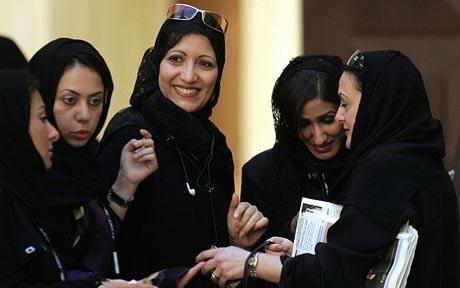 The Kingdom of Saudi Arabia is notorious for its sexual segregation. Fanatical breaded theocratic thugs room the streets making sure that unrelated sexes do not mix with one another even in the company of others and in the most public of places. An innocent interaction could land both persons under the tyranny of the whip.
The Kingdom of Saudi Arabia is notorious for its sexual segregation. Fanatical breaded theocratic thugs room the streets making sure that unrelated sexes do not mix with one another even in the company of others and in the most public of places. An innocent interaction could land both persons under the tyranny of the whip.
Months prior, a 70-year-old widow was arrested and sent to months in jail and roughly 70 lashes for the crime of being in the company of an unrelated male. The young male is a friend of her nephew and they stopped by her home to deliver bread. This is how extreme the segregation is enforced.
But it may be about to end, fortunately. After years of preaching that Islam requires it (which it, of course, does not and only S.A. ever enforced such segregation. Even the Islamic Republican of Iran does not have such laws) the religious clergy is finally admitted that it misunderstood Islamic law:
In the past few months top religious officials, including the minister of justice and the head of the religious police in the Mecca region, which includes Jeddah, have declared ikhtilat a modern term not proscribed by Islamic law. Saudi jurisprudence has erred, they say, by confusing conservative tribal custom with the rules of sharia, thus lumping the innocent mingling of the sexes with the true sin of khulwa, meaning an unmarried, unrelated couple’s “seclusion” in a setting that could tempt devilishness. In support of this argument, they note that wives in the Prophet Muhammad’s time are known to have served male guests and that even today, Saudis rely on maids and drivers in a practical form of daily ikhtilat.
This does not mean that sexual segregation has ended over night in the Kingdom: “Last month in the eastern city of Dammam, religious police dragged a woman out of a public lavatory and beat her after she was spotted leaving a man’s car, said witnesses in Saudi newspapers.”
But this admission may usher in a new tolerance that eventually will end the power of the religious thugs who go around beating up men and women for innocently gathering. It is not going to happen over night, but this ruling will make it happen.
And, who knows?, maybe soon women will be able to drive too:
during November’s freak floods in Jeddah that killed 122 people, Malak al-Mutairi, a girl in her teens, gained brief fame by defying the ban on women drivers. Borrowing her dad’s 4 x 4, she towed nine car loads of stranded people to safety. No one, it seems, complained.
Every movement of reform has its moment and it all being slowly. Hopefully this is the Arabian moment.
Source: The Economist.



